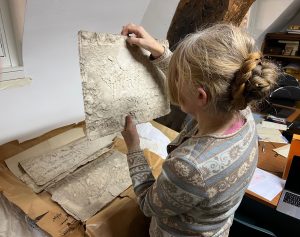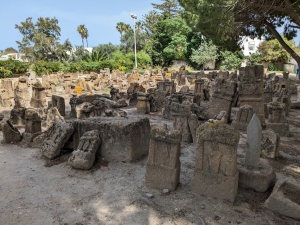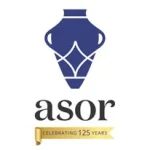
STUDY OF COLLECTIONS FELLOWSHIPS
ASOR plans to offer two fellowships of $2,000 each to support the study of collections in 2025. Applicants must be current ASOR members. The collections covered by these fellowships include museum and archival collections, repositories, or collections of national authorities. The fellowship funds may be used to support travel and per diem expenses. Other direct expenses are permissible, but they may not exceed one-third of the funds received from ASOR. Indirect and/or overhead expenses are not allowable.
A committee comprised of ASOR members and staff will review the proposals. Applications must be received by February 26, 2025, in order to ensure full consideration. The committee hopes to announce its selections by the end of March. Fellowship funds should be used by September 1, 2025. Any unused funds must be returned to ASOR and will be used to fund fellowships in future years. Awards may not be postponed.
Application Deadline: February 26, 2025
How to Apply
Send applications and inquiries by e-mail only to the ASOR Collections Fellowship Committee, c/o Marta Ostovich, programs@asor.org. Please include the subject line “ASOR Collections Fellowship” in your e-mail. Applications must include the following in one single PDF document (using a standard 12 point font and one inch margins):
1. A cover letter (not to exceed one page) indicating your research interests and the suitability of the proposal.
2. A two-page proposal outlining the research, description of the collection(s), and the importance/scope of the proposed project.
3. A curriculum vitae (two pages maximum).
4. A budget (1 page maximum) that includes other grants or resources that will be used to support the proposed project.
5. Contact details (e-mail and phone) for one or two referees who have given permission to be contacted.
Eligibility
Applicants must be current ASOR members.
Preference will be given to ASOR members who work in the fields of the Near East and wider Mediterranean who hold the Ph.D. or equivalent terminal degree. Additional preference will be given to applicants who have not received another ASOR fellowship or grant in the past five years. These fellowships may be combined with other research funds, but this support must be described in the application. The selection process will take into account the quality of research, the scope and type of the material being studied, and the impact of the proposed research.
Fellowship recipients will be required to submit a brief report (ca. 500 words together with at least two high-resolution images) within 45 days of the conclusion of their research travel. Recipients will be required to sign a waiver indicating that ASOR is not responsible for any injuries they might sustain during their travel to the chosen collection(s). They will also be required to sign a release of rights to ASOR for the inclusion of their report and photographs in one of ASOR’s publications (including the ASOR website or other promotional materials). Publications resulting from this fellowship must acknowledge ASOR, and recipients must provide ASOR with a digital or hard-copy of any publications resulting from this research. Recipients grant ASOR permission to use any reports or publications in ASOR publications, the ASOR website, and/or promotional materials.
Study of Collections Fellowship Recipients: $34,000 awarded
2025: $4,000 awarded
- Erin Darby, University of Tennessee, “Missing Ritual Objects from the Nelson Glueck excavations of Kheleifeh,” ASOR Archives at the American Heritage Center, Wyoming
- Laura Alvarez, University of Cambridge, “Me and We in the Mirror. A Study of Self and Other from Mesopotamia to the Levantine Coast during the Fourth and Second Millennia BCE,” Louvre and Iraq Museum
2024: $4,000 awarded
- Jennie Ebeling, University of Evansville, “Analysis of Ground Stone Artifacts from Tell en-Nasbeh, Palestine” Badè Museum of Biblical Archaeology”
- Holly Winter, University of Sydney, “The Land Behind Aleppo: Urban Life and State Formation in Bronze Age Syria” Harvard Museum of the Ancient Near East”
2023: $4,000 awarded
- Helen Dixon, East Carolina University, “Study of Punic inscribed stelae with maritime iconography in the collection of the Carthage National Museum, Tunisia”
- Jon Paul Heyne, University of Dallas, “Social Mobility of Religious Minorities in the Medieval Mediterranean: The Case of the Franciscans of the Holy Land Custody”
2022: $8,000 awarded
- Joseph A. Greene, Harvard Museum of the Ancient Near East, Kelsey Museum Archives-Michigan Excavations in the Carthage Sanctuary of Tanit (US)
- James D. Moore, Humboldt-Universität zu Berlin, Cabinet du Corpus Inscriptionum Semiticarum in the Académie des Inscriptions et Belles-Lettres-Semitic Artifacts Database (France)
- Michael Press, University of Agder, The Antiquities Market in Late Ottoman Palestine (London, Paris, and Jerusalem)
- Matthew J. Suriano, University of Maryland, Cabinet du Corpus Inscriptionum Semiticarum in the Académie des Inscriptions et Belles-Lettres-Clermont-Ganneau Collection (France)
2019: $4,000 awarded
- Katherine Larson, Corning Museum of Glass, “The Roman Glass Workshop at Jalame, Israel: A Traveling Exhibition”
- Joanna Smith, University of Pennsylvania, “Textile production in first millennium BCE Cyprus’”
2018: $4,000 awarded
- Melissa Cradic, University of California, Berkeley, “Decoding Death: The Investigation of Bronze Age Tombs in the Levant”
- Morag Kersel, DePaul University, “Follow the Pots – Locating Early Bronze Age Tomb Groups from Bab adh-Dhra’”
2017: $6,000 awarded
- Lesley Gregoricka, University of Notre Dame, “Identity and Place of Burial in Early Bronze Age Jordan: A Biogeochemical Comparison of Charnel House Human Remains”
- Samuel Wolff, Palestine Exploration Fund, London, “Alan Rowe’s 1934 Excavation at Tel Gezer”
- Gina Konstantopoulos, Iraq Museum, “Beyond the Frontier: the Construction of Distant and Imagined Lands in the Ancient Near East”



